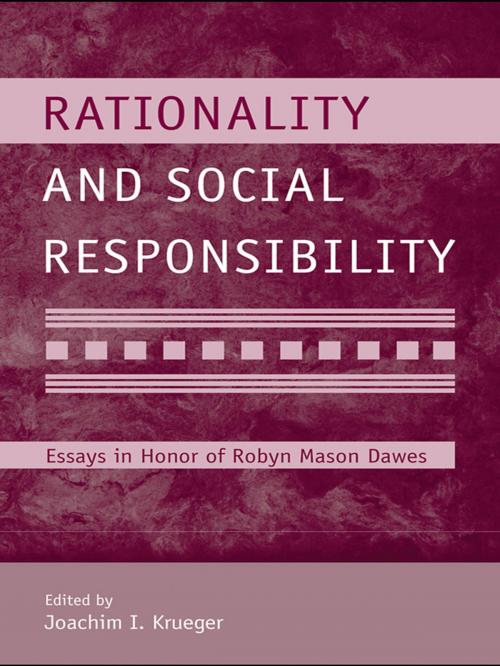Rationality and Social Responsibility
Essays in Honor of Robyn Mason Dawes
Nonfiction, Health & Well Being, Psychology, Social Psychology| Author: | ISBN: | 9781135703868 | |
| Publisher: | Taylor and Francis | Publication: | April 9, 2008 |
| Imprint: | Psychology Press | Language: | English |
| Author: | |
| ISBN: | 9781135703868 |
| Publisher: | Taylor and Francis |
| Publication: | April 9, 2008 |
| Imprint: | Psychology Press |
| Language: | English |
This volume brings together a diverse group of authors who have been associated with Robyn Dawes over the years. The breadth of topics covered reflects Dawes’s wide-ranging impact on psychological theory and empirical practice. The two themes of rationality and social responsibility are well developed in the book. Dawes had always urged investigators to take seriously the question of how individuals can reconcile self-interest (i.e. rationality) with the collective good (i.e. social responsibility). The area of judgment and decision-making poses a similar challenge: here, rational judgment is the most responsible judgment because it minimizes errors. To attain rationality in this domain, individuals need to accept the limitations of their own intuitions.
This volume presents an up-to-date overview of how far psychological science has come in its struggle to reconcile what is true with what is good. Each chapter is a stimulus for new research and a reminder not to forget the hard-won lessons of the past – in particular, those taught by Robyn Dawes.
This volume brings together a diverse group of authors who have been associated with Robyn Dawes over the years. The breadth of topics covered reflects Dawes’s wide-ranging impact on psychological theory and empirical practice. The two themes of rationality and social responsibility are well developed in the book. Dawes had always urged investigators to take seriously the question of how individuals can reconcile self-interest (i.e. rationality) with the collective good (i.e. social responsibility). The area of judgment and decision-making poses a similar challenge: here, rational judgment is the most responsible judgment because it minimizes errors. To attain rationality in this domain, individuals need to accept the limitations of their own intuitions.
This volume presents an up-to-date overview of how far psychological science has come in its struggle to reconcile what is true with what is good. Each chapter is a stimulus for new research and a reminder not to forget the hard-won lessons of the past – in particular, those taught by Robyn Dawes.















